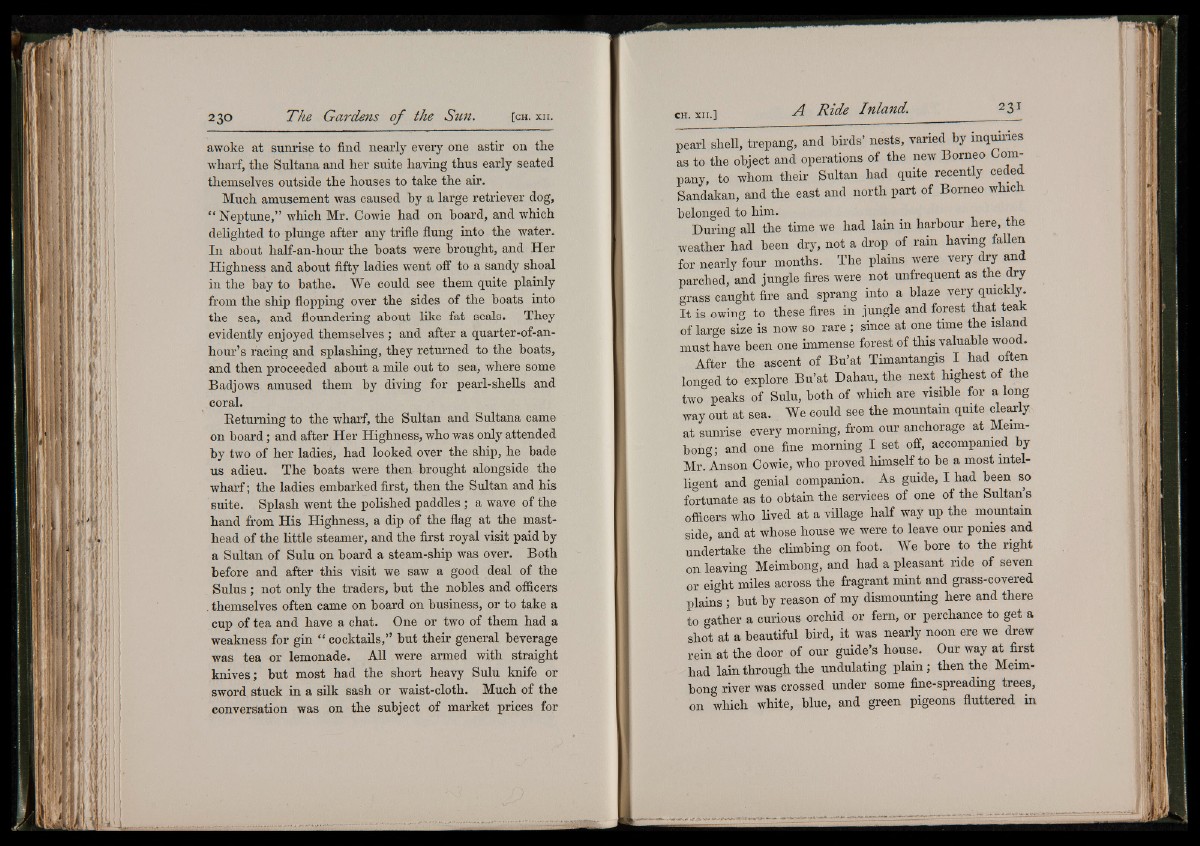
awoke at sunrise to find nearly every one astir on the
wharf, the Sultana and her suite having thus early seated
themselves outside the houses to take the air.
Much amusement was caused by a large retriever dog,
“ Neptune,” which Mr. Cowie had on board, and which
delighted to plunge after any trifle flung into the water.
In about half-an-hour the boats were brought, and Her
Highness and about fifty ladies went off to a sandy shoal
in the bay to bathe. We could see them quite plainly
from the ship flopping over the sides of the boats into
the sea, and floundering about like fat seals. They
evidently enjoyed themselves ; and after a quarter-of-an-
hour’s racing and splashing, they returned to the boats,
and then proceeded about a mile out to sea, where some
Badjows amused them by diving for pearl-shells and
coral.
Returning to the wharf, the Sultan and Sultana came
on board; and after Her Highness, who was only attended
by two of her ladies, had looked over the ship, he bade
us adieu. The boats were then brought alongside the
wharf; the ladies embarked first, then the Sultan and his
suite. Splash went the polished paddles ; a wave of the
hand from His Highness, a dip of the flag at the masthead
of the little steamer, and the first royal visit paid by
a Sultan of Sulu on board a steam-ship was over. Both
before and after this visit we saw a good deal of the
Sulus ; not only the traders, but the nobles and officers
. themselves often came on board on business, or to take a
cup of tea and have a chat. One or two of them had a
weakness for gin “ cocktails,” but their general beverage
was tea or lemonade. All were armed with straight
knives; but most had the short heavy Sulu knife or
sword stuck in a silk sash or waist-cloth. Much of the
conversation was on the subject of market prices for
pearl shell, trepang, and birds’ nests, varied by inquiries
as to the object and operations of the new Borneo Company,
to whom their Sultan had quite recently ceded
Sandakan, and the east and north part of Borneo which
belonged to him. ,<
During all the time we had lain in harbour here, the
weather had been dry, not a drop of rain having fallen
for nearly four months. The plains were very dry and
parched, and jungle fires were not unfrequent as the dry
grass caught fire and sprang into a blaze very quickly.
It is owing to these fires in jungle and forest that teak
of large size is now so rare ; since at one time the island
must have been one immense forest of this valuable wood.
After the ascent of Bu’at Timantangis I had often
longed to explore Bu’at Dahau, the next highest of the
two peaks of Sulu, both of which are visible for a long
way out at sea. We could see the mountain quite clearly
at sunrise every morning, from our anchorage at Meim-
bong; and one fine morning I set off, accompanied by
Mr. Anson Cowie, who proved himself to be a most intelligent
and genial companion. As guide, I had been so
fortunate as to obtain the services of one of the Sultan’s
officers who lived at a village half way up the mountain
side, and at whose house we were to leave our ponies and
undertake the climbing on foot. We bore to the right
on leaving Meimbong, and had a pleasant ride of seven
or eight miles across the fragrant mint and grass-covered
plains ; but by reason of my dismounting here and there
to gather a curious orchid or fern, or perchance to get a
shot at a beautiful bird, it was nearly noon ere we drew
rein at the door of our guide’s house. Our way at first
had lain through the undulating plain; then the Meimbong
river was crossed under some fine-spreading trees,
on which white, blue, and green pigeons fluttered in